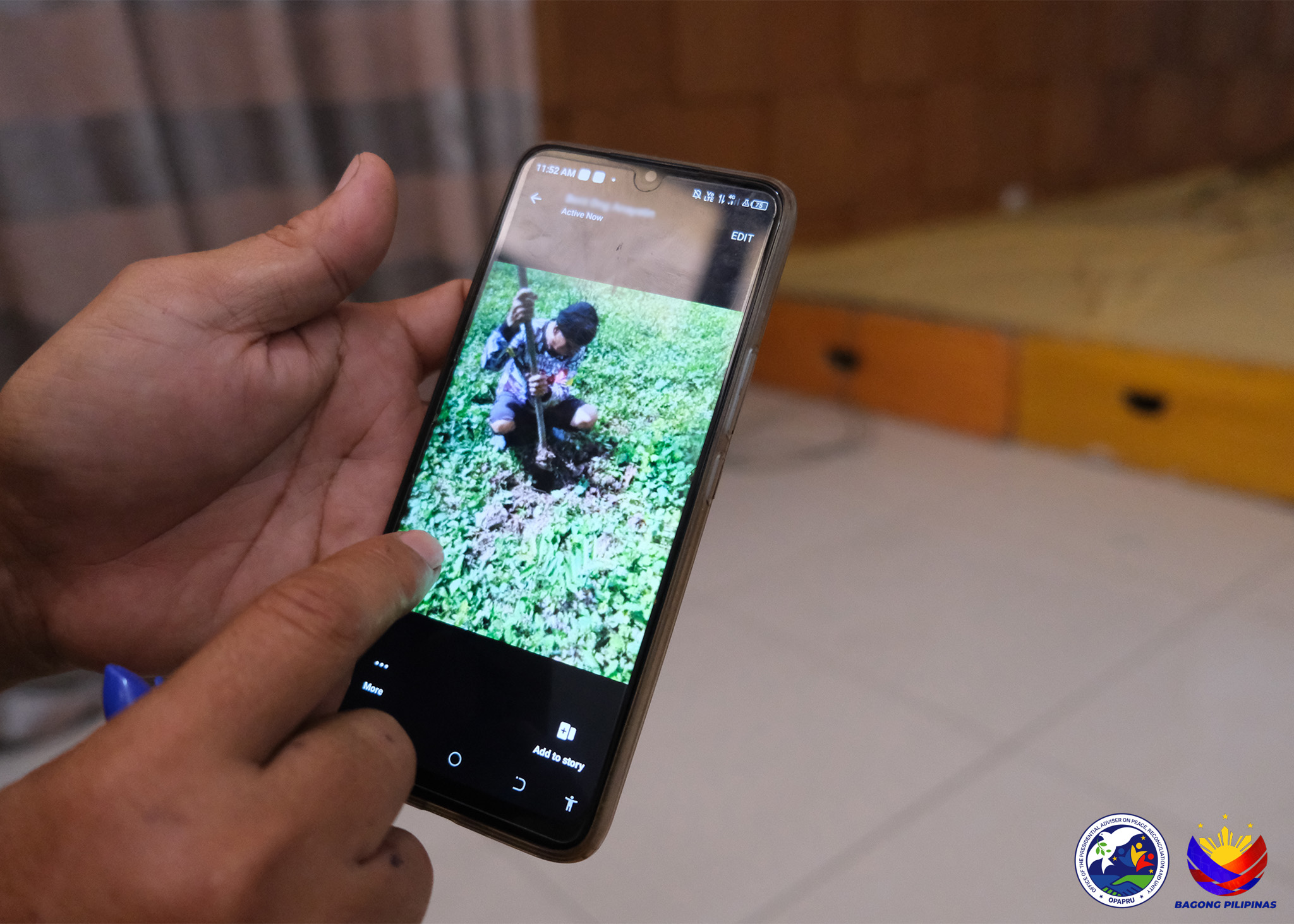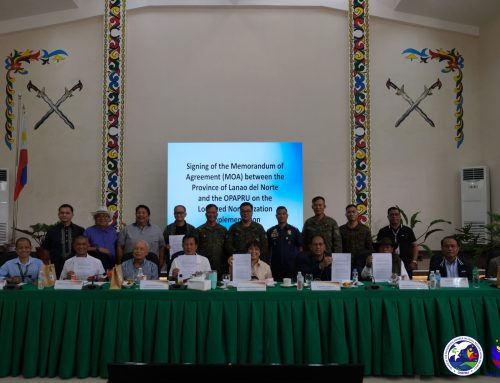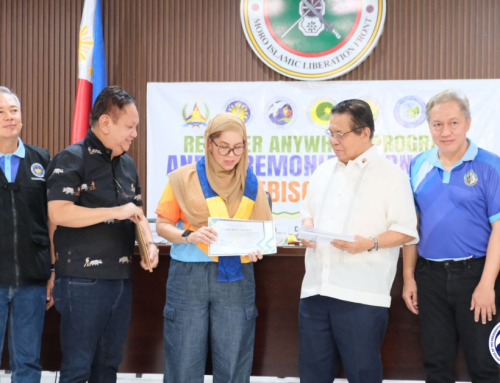CAMP DARAPANAN, SULTAN KUDARAT, MAGUINDANAO — In the rugged terrain of this town once marred by conflict and strife, a remarkable success story has emerged — one that highlights resilience, reconciliation, and the transformative power of peace.
This is the story of Aladin, 56, a former Moro Islamic Liberation Front (MILF) combatant who, against all odds, transitioned from a life of armed struggle to becoming a thriving farmer after the signing of a historic peace agreement between the Government and the MILF.
“Two hundred seventy-six (276) hectares [ang] minana ko sa tatay ko. Nasa akin ang titulo. Iniwan ko dahil magulo doon,” he said.
Aladdin’s journey began in this Central Mindanao municipality, where poverty and conflict were deeply entrenched.
Like many of his comrades, he found himself drawn into the struggle for autonomy, joining the ranks of Moro rebels who were fighting for their people’s right to self-determination
For years, he lived a life filled with uncertainty, confronting not only the challenges caused by conflict, but also the hardships of cultivating a meager piece of land to sustain himself.
“Andito nalang ako sa Camp Darapanan dahil tahimik, nakabili ako ng eight hectares,” he recalled.
A new beginning
Everything changed with the signing of the Comprehensive Agreement on the Bangsamoro (CAB). As part of the decommissioning process, Aladdin embraced the opportunity for a new beginning.
“Ito ‘yung niyog na ginawa ko, tin-ry ko ‘yan. ‘Yung nakita ko sa Youtube na 3.5 to 4 meters interval na pagtatanim. Ako po ang nagtatanim. Ito po ‘yung tatay ko, ‘nung bumisita po siya, nag-guguide po siya sakin,” Aladin shared as he scrolled through photos of his farm on his phone.
According to him, the peace agreement allowed him to lay down his arms, return to his ancestral lands, and reclaim his identity as a farmer.
“Kasi ‘yung lupa namin doon ay fertile naman dun sa bukid namin. Inapply ko ‘yung organic fertilizer. Mas mahaba ‘yung nakikipag-compete ‘yung mais ko sa damo,” he explained.
“Tumataba ‘yung damo, tumataba din ‘yung mais ko. Hindi nakakalaban ‘yung mais ko sa pag-consume ng organic fertilizer. Total mataba naman ‘yung lupa. Ang ginawa ko ay niyog na lang. Mas malakas pa [ma-]consume ang coconut ‘dun,” Aladin added.
Equipped with newfound hope, Aladin set out to transform his once war-torn fields into a thriving agricultural venture.
With the aid of the Task Force for Decommissioned Combatants and their Communities (TFDCC), which is under the Office of the Presidential Adviser on Peace, Reconciliation and Unity (OPAPRU), he received training in modern farming techniques, sustainable practices, and market-oriented strategies.
This knowledge, coupled with his innate connection to the land, motivated him to venture full time into farming.
“Yung last year, [nagtrain] po ako sa pagawa ng organic fertilizer. Gusto ko magtraining uli. Lahat ng training at knowledge [na pwede ko] makuha. Gusto ko [ng mga] ganyan, magtahi. Gusto ko rin ng pagluto. Sa totoo lang, ‘di talaga ako ganun karunong magluto,” said Aladin, as he hopes to enroll in a cooking training course under the socioeconomic program of the government.
Aladin’s commitment to peace has extended beyond the boundaries of his farm. He has actively participated in community-building activities, fostering unity among former rebels and their neighbors.
A beacon of peace and development
By sharing his story of transformation, he has inspired others to embrace the peace process and work even harder to improve his socioeconomic condition.
Over the years, Aladin’s farm has become a show window of peace and development in the entire community.
“May mga katulong ako na kapitbahay. ‘Yung mga tauhan sa barangay o ‘yung BPAT sa Brgy Tamontaka ay wala na silang sahod. So, inadopt ko sila. Dito kayo sa akin kay anuman makain ko ay isheshare ko ‘yun kung magustuhan niyo,” he shared.
His dedication and hard work has resonated beyond his neighborhood, illustrating the potential for positive change that lies within the heart of every conflict-torn community.
Today, Aladin’s story stands as a testament to the transformative power of peace. His journey from a former fighter to a thriving farmer showcases the resilience of the human spirit and the profound impact that reconciliation can have on individual lives and entire communities.
“‘Yung mga nasa bundok, mga humahawak pa rin ng baril, sana makag isip-isip sila at magpatanto nila kung hahahanapin nila ‘yung peaceful. Peace of mind, ‘yung peaceful ay ‘dun nila makikita ang pag-asa ng buhay,” he said.
“Kung gusto mo magbuhay ng tahimik syempre, ‘wag ka na maghawak ng baril. Kundi ikaw ang mapatay, ikaw ang masaktan [at] ikaw pa ang makasakit sa kapwa mo, di ba? So, ‘yun ang sa akin gusto ko ng katahimikan at peaceful,” he added.
Aladin said that he will always be grateful to the government for the success he is now reaping. Reintegrating into society is the best decision for him, especially now that he can be with his family.
“Sana tumupad sila sa mga pinangako at sinumpuan. Sana kung ano ‘yung sinumpaan, ‘yun ang kanilang ipamulat sa mamamayan.”
Aladin’s fields, once witness to conflict, now stand as a symbol of growth, prosperity, and the enduring hope for a peaceful and thriving Bangsamoro region. ###












